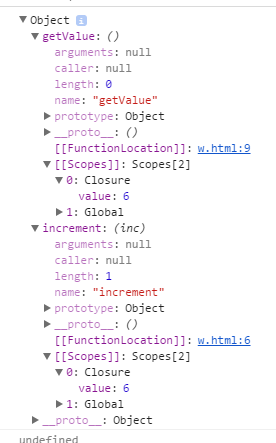initialize myObject by calling a function that returns an object literal
w作用域控制变量的可见范围。
JavaScript: The Good Parts
Instead of initializing myObject with an object literal, we will initialize myObject by calling a function that returns an object literal. That function defines a value variable. That variable is always available to the increment and getValue methods, but the function's scope keeps it hidden from the rest of the program
1 <script type="text/javascript"> 2 var wObject = function () { 3 var value = 0; 4 return { 5 increment: function (inc) { 6 value += typeof inc === 'number' ? inc : 1; 7 }, 8 getValue: function () { 9 return value; 10 } 11 } 12 }(); 13 wf(wObject) 14 function wf(w) { 15 console.log(w) 16 } 17 18 wf(wObject.increment(3)) 19 wf(wObject.getValue()) 20 wf(wObject.increment(3)) 21 wf(wObject.getValue()) 22 23 var wObject = function () { 24 var value = 0; 25 return { 26 increment: function (inc) { 27 value += typeof inc === 'number' ? inc : 1; 28 return 'www'; 29 }, 30 getValue: function () { 31 return value; 32 } 33 } 34 }(); 35 wf(wObject) 36 function wf(w) { 37 console.log(w) 38 } 39 40 wf(wObject.increment(3)) 41 wf(wObject.getValue()) 42 wf(wObject.increment(3)) 43 wf(wObject.getValue()) 44 </script>




